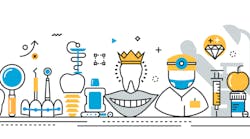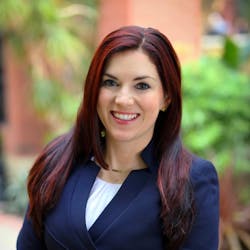“Where are all the good candidates?” is a phrase I often hear from dentists around the country, especially during the current global pandemic. Professionals are in search of practices that are committed to creating a culture that supports, respects, values, and not only listens to their employees but makes adjustments based on their concerns. Employees who are provided with opportunities to maximize their careers, along with the necessary accountability, are not only more likely to stay with their employer longer, they are more fulfilled overall. Now more than ever, our patients need dental clinicians who can utilize a comprehensive set of skills to identify and prevent the progression of diseases. In order to deliver the best care to our patients, we need healthy communication and effective strategies to optimize each team member's strengths. Here are four key strategies that practices can follow to recruit high-quality candidates and retain employees long term.
Create stakeholders
A stakeholder in your practice is someone who is truly invested in the success of the practice, and who cares about every step in the patient experience. Many exceptional professionals thrive in environments that make them feel empowered and valued; they understand that the work they do isn't just important, but essential to the success of the practice and to patients’ health. Employees who think like stakeholders enjoy increased confidence and regularly go the extra mile for the practice.
There are many ways to cultivate stakeholders in a practice. This could look like implementing a bonus structure, commission, or other office incentives, but for most clinicians, feeling like they are truly appreciated is most effective. Taking the time to thank clinicians for going above and beyond or acknowledging a well-positioned full-mouth series reinforces the desire to strive to deliver high-quality work.
Gary Chapman, the author of The Five Love Languages, wrote another book specific to the workplace called The Five Languages of Appreciation in the Workplace.1 Cultivating the right “work appreciation language” for your office requires an understanding of what each employee needs in order to feel appreciated. This is essential to fully expressing gratitude and creating a positive culture in the office. For example, while some employees may appreciate receiving public praise for going above and beyond in some way, others may feel embarrassed being made the center of attention. One employee may prefer a gift like a coffee to show appreciation, whereas others prefer a high-five. When teams understand how to communicate with one another using their “work appreciation language,” it promotes positive morale in the office. Happy employees contribute to a healthy office culture, collaborative teamwork, and of course, a superior patient experience.Build a culture that plays to employee strengths
As a dental consultant, the first question that I ask when I am working with a client has to do with their practice culture. I want to understand what the practice owner believes their practice culture is. Creating a culture takes accountability, consistency, and constant communication to ensure each team member understands their role in the success of the practice. It is essential to also determine what is working well and what needs to be adjusted to allow the team to thrive. Practices cannot be successful when the leadership team is not collaborating with team members.
One of the best ways to create a positive culture is to use strength assessments to maximize team members’ strengths. Determining what employees enjoy is also important. In one of my practices, the assistant enjoys variety when working full-time in assisting. She floats between three doctors in her four-day weekly schedule to allow her to hone her skills while feeling like she’s not doing the same thing every single day. Each employee has strengths that can be a true gift to the office if they are identified and used properly. At times, they may require adjusting a team member's role to one that is better suited for them. Instead of losing an employee who has a great attitude but may have lost their passion, or may be struggling in their current role, consider moving them into a different role.
Support employee performance with training
My first job as a dental hygienist was for a practice in New Haven, CT. The practice had five different dentists who all wanted a case presentation done differently. This was a new graduate's nightmare, as I was overwhelmed by how to deliver excellent patient care within an hour. This office had worked with multiple consultants who had set them up for success. Each dentist had a different primary focus during their examinations. When I had a patient cancellation, I was asked to observe a dentist to familiarize myself with how they preferred to practice. Multiple times a week, I would review clinical cases with the doctors to learn what worked well and what they would change in the future. This office mentored me better than any other office I have ever worked for. I knew what films were needed, and each and every clinical assessment the dentist would need to make the diagnosis. We had annual reviews and monthly meetings to measure our team success.
Encourage new employee collaboration
I find that some employers prefer to hire new graduates because they have fewer bad habits that require retraining. However, when existing team members are used to train new employees, legacy errors may occur. A legacy error is an error that’s passed down to new employees. For example, in the case of infection control training, an employee trainer may rely on outdated information and disregard the fact that while in school, clinicians often learn the highest level of infection control and sterilization processes. Asking the new employee to simply comply with the way the practice processes instruments and sterilizes rooms without taking time to ask the trainee for input is a missed opportunity to both adopt the latest science and technologies, and to encourage collaboration.
Legacy errors run rampant in practices if employees are training new team members. This is because we tend to normalize things over time if there is no accountability to science-based procedures. A team member needs to understand the exact vision and mission of the practice as well as how each procedure is conducted properly. COVID-19 has brought to light many legacy errors in dental practices, and candidates want to be assured that the infection control procedures in place are adequate.
When there are systems in place to measure employee performance and support teams working toward common goal, practices can be extremely successful. Dental practices that create a culture of communication, define systems and processes, and show that they value their employees will attract and retain high-caliber clinicians.
Reference
- How to speak the 5 languages of appreciation in the workplace. Energy2Engage. Accessed October 27, 2020. https://www.energy2engage.com/blog/how-to-speak-the-5-languages-of-appreciation-in-the-workplace
Amber Auger, MPH, RDH, is a practicing dental hygienist and clinical innovations implementation specialist. With 14 years of experience in the dental industry, Auger works with practices to provide customized protocols, to refocus on the patient experience, and to utilize systemic approaches to periodontal therapy. She is a regular contributor to RDH magazine, a featured author for DentistryIQ, and host of #AskAmberRDH. Auger also provides preventive services abroad yearly and is always willing to have dental professionals join her team. She can be reached at [email protected].







